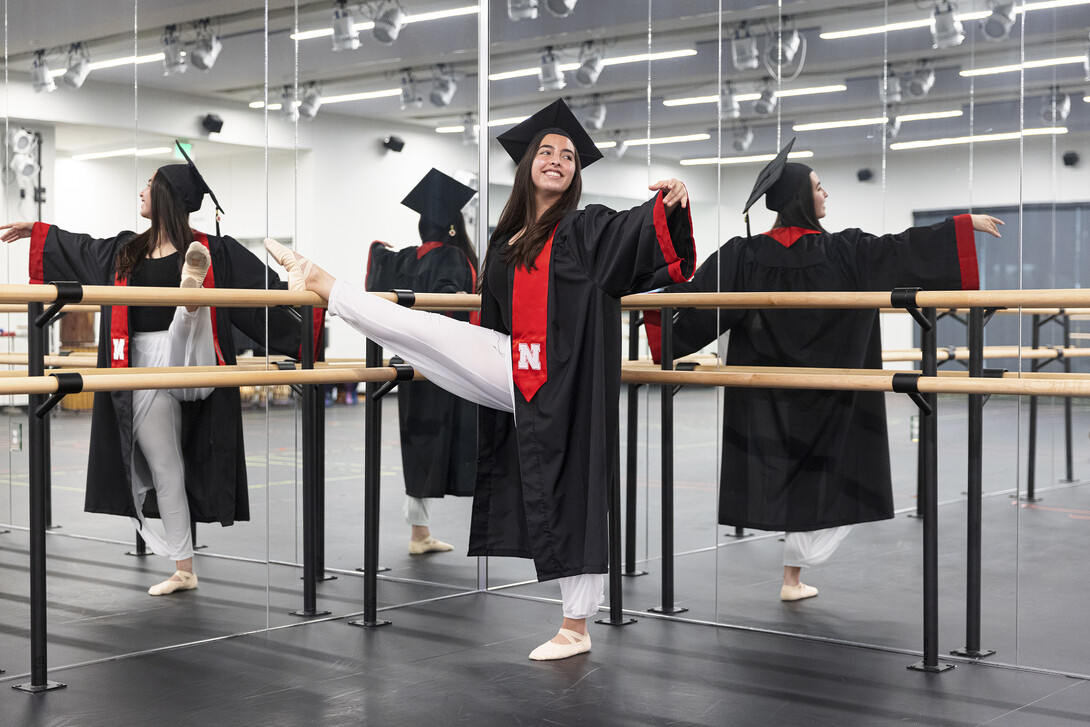
Anamaría Guzmán Cárdenas isn’t going to box herself in. She never has, and it’s served her well.
She’s always followed opportunities that felt right and piqued her curiosity. That’s how, as a high school student in Bogota, Colombia, she followed her intuition to the University of Nebraska–Lincoln.
“I had never heard of Nebraska, but an (education) agency we were working with was hosting a presentation about it,” Cárdenas said. “Something in me said to go, try it out.”
Cárdenas’ interactions with the recruitment specialist at the time, Brent Schmoker, along with others at the university, solidified her decision to make Nebraska the next stop on her academic trajectory.
“They showed they cared throughout the process,” Cárdenas said. “Instead of scrolling through a computer, overwhelmed by all the paperwork, there’s someone there to help you. And that makes a whole world of difference, especially for our parents, because the parents are the biggest part of the decision-making process, as well.”
Cárdenas found her footing quickly on campus, but being away from her parents was hard. She found a community, though, and through activities that included being a New Student Enrollment Leader and a member of the international student welcome team, Cárdenas developed leadership skills she didn’t know she could.

Cárdenas initially majored in psychology, but neuroscience appealed more. As a child, she’d always loved science, and the brain particularly fascinated her.
“Why are people the way they are? What drives them? What motivates them?” Cárdenas said. “There are all these amazing questions, and it’s so complex, but I think I always thought that understanding the brain is the way that we understand ourselves, because really, it’s the machinery that drives us. It’s this beautiful organ that allows us to be conscious, be aware and experience the world.”
Cárdenas wanted to major in neuroscience — then learned the major didn’t exist. She talked with her adviser and some faculty members about her interests and her aspirations. Eventually, they found a way. Cárdenas worked with Scott Stoltenberg, associate professor of psychology, to develop an Individual Program of Studies with a neuroscience track. She added biology and chemistry minors.
“I considered myself pre-med, and I wanted to be a doctor,” she said. “My, how things have changed.”
In addition to always having loved science, Cárdenas also grew up with a love of dancing. She never had any formal training, but dance is part of the cultural fabric of her country.
“We’re a social culture and known for dancing,” Cárdenas said. “We grew up learning all these dances — the salsa, merengue. They were all part of how we celebrated.”
At the university, Cárdenas joined the Ballroom Dance Club, a registered student organization, and learned the foxtrot, waltz and tango, finding herself drawn even more to dance.
Despite the deleterious effects of COVID-19, Cárdenas was able to find a silver lining by exploring more about the world of dance while in quarantine with her roommates. She discovered that dance was being used as a form of therapy for numerous health issues, including neurodegenerative diseases.
It felt like serendipity.

“I was feeling a little burned out with the science, and I had a really tough semester,” Cárdenas said. “I love it so much, but it felt like I didn’t have the fire any more. I just really loved dancing. It was helping me so much getting through quarantine, keeping me sane.
“I felt like dance had a power to change the mind. I went on Google and started searching for careers that could somehow mix dancing and science, and I found the master’s program for dance as therapy.”
Cárdenas also decided to get formal dance training by taking dance classes in the Hixson-Lied College of Fine and Performing Arts in the fall and spring semesters of the 2020-2021 academic year. That helped her get accepted into the master’s program for movement and dance therapy at Lesley University in Cambridge, Massachusetts, which she’ll begin in the fall, after graduating at Nebraska on May 8. There are only a handful of such programs in the United States.
“I am really excited to be a part of something so new and innovative,” she said. “I hope to someday have my own lab, researching dance and neuroscience, where we use dancing as a way to understand our brain better and to treat disease.”
Despite a difficult transition to college life so far away from home, academic headaches when classes seemed impossible, and the hardships of a global pandemic, Cárdenas said her time at Nebraska has been transformative.
“I don’t regret those struggles and challenges I had, because that’s when you learn your most important lessons,” Cárdenas said. “Through discomfort, we learn the lessons we need to learn for ourselves and our path.”







